A salute to everyone reading this interview. I had the honor to talk with JOANTHAN CUARTAS; american filmmaker with colombian roots; director and writer of the Vampirism - Drama - Horror movie MY HEART CAN'T BEAT UNLESS YOU TELL IT TO making it his directorial debut. This indie - low budget movie talks about the family solidarity, the sacrifices of anyone can do for a son, brother or mother in this case a brotherhood bond that goes beyond the normality and shapes all that in a fiction world of vampirism and solitude. The movie follows "...a family of three siblings living in a claustrophobic house, the older siblings finding themselves at odds over care for their ailing younger brother. To stay alive, he must consume human blood, but he's too weak to get the blood on his own. His siblings have to find victims and drain them of their blood to keep him fed. This is a vampire film, but also a film about the dynamics of a family when thrown into dire circumstances.." (Jonathan Cuartas).
As you will read below, JONATHAN based his directorial feature movie upon his short film called "KURU" and personal situations he will explain us in this interview which lines the same story roots but on cannibalism... He highlights in this a well-established frame and low movements categorizing the pace of the movie and pointing us the path of what is the tone and theme of the film. The movie ran at Tribeca Film Festival with claps on its side, it has its vod, digital and limited theaters relese on June 25, 2021 and then its DVD - Bluray release on August 10, 2021, in Rotten Tomatoes has an amazing 98% (Rottentomatoes)
Without further ado, you, indie filmmaker, newbie filmmaker with lots of questions and interrogates about how to shoot your first horror movie, scroll down and read this usable interview, JONATHAN will tell us about his writing method, the obstacles he faced up, the setbacks during shooting, his thoughts that sure will helps us to understand a little more the sinuous world of indie filmmaking.
EFF: Let me thank you first for letting me interview you, really. Tell us where you are from and where your interest in filmmaking stemmed from.
JC: Thank you for the questions! I was born and raised in Miami. My parents are from Colombia. I think my interest in film stemmed from going to the movie theater about two or three times a week as a child. Watching movies on the big screen was always a tradition, so I think I naturally grew an interest in cinema. I didn't know, however, that I wanted to pursue a career in filmmaking. It was storytelling that interested me from the start. I started drawing comics in Elementary School with some of my friends, and in High School I took a creative writing class. I didn't actually learn about the craft of filmmaking until college. My dad is also very skilled at the arts: painting, architecture and now production design. I must have gotten the artistic gene from him.
EFF: "My Heart Can't Beat Unless You Tell It To" is your directorial debut, firstly, tell us what the movie is about?
JC: The movie follows a family of three siblings living in a claustrophobic house, the older siblings finding themselves at odds over care for their ailing younger brother. To stay alive, he must consume human blood, but he's too weak to get the blood on his own. His siblings have to find victims and drain them of their blood to keep him fed. This is a vampire film, but also a film about the dynamics of a family when thrown into dire circumstances.
MY HEART CAN'T BEAT UNLESS YOU TELL IT TO (2020)
EFF: You are also the writer of the movie. How did you come up with the story? And while elaborating the screenplay what creative walls did you have to demolish to keep moving forward?
JC: The story comes from an experience I had when my grandmother was in hospice back in 2016. I have a huge family, and we were all in this cramped house, trying to say our goodbyes. We knew my grandmother wasn't gonna get any better, but it felt impossible to determine when it was the right time to let go. It was the experience of accepting the death of a loved one. I wanted to write a film about this experience, and I gravitate toward horror, so me and my team tried to find the appropriate subgenre for a story about familial codependency and sacrifice. We figured vampirism was the right fit.
There are a lot of moments where I don't know what I'm doing. This was the first feature screenplay I ever wrote. When I feel stuck or blocked I have to try and reel myself back in and remember why I'm telling this particular story. It all comes from something very personal, and I have to keep reminding myself that the story means something to me. That helped me push forward and keep the momentum.
EFF: If any, what references from other films or stories can we expect from your film? Speaking in terms of the plot.
JC: I was very inspired by Dogtooth, particularly in the ways in which Yorgos Lanthimos creates these strange rituals within a family unit. I was more interested in the traditions the siblings in my story created to make their existence bearable, than the vampire tropes most audiences are already familiar with. I wanted to get more personal, more character-driven, as opposed to focusing on the backstory of how the younger brother became a vampire in the first place.
EFF: Now, let's get into the project itself. How was the process of getting the film green light to start pre production, I mean, did you have to pitch it or did somebody contact you?
JC: My brother Michael (cinematographer) and I have always pushed ourselves to work on as many films as possible, not just in our respective roles, but below-the-line as well. I have edited many films, worked in departments I'm not even good at, just to get myself out there and reach as many other filmmakers as possible. Michael and I worked on a film directed by Kenny Riches, and we grew a solid friendship before he asked about what we were working on. I pitched my script and a short I made that served as a proof-of-concept, and he showed it to his producing partner. We were able to secure financing through their company Dualist, and we hit the ground running. It's always hard to say how exactly one finds funding, but in my case, it was all about perseverance and making friendships within the industry by working, and in some cases volunteering, on many productions.
EFF: What were those setbacks you faced up during principal photography and how did you solve them out?
JC: There are too many to name, but one of the biggest setbacks was not finding the right house location. This was pivotal, seeing as most of the movie takes place in it. We just couldn't find the right spot, no matter how hard we looked. It's funny how things work out. Our producer Kenny was driving us around town looking for potential locations, when we drove past his childhood friends' house. He stopped in front of it, just to show us where he grew up, not thinking that would be the place where we shot the film. One of his friends still lived in the house, and was very open to us shooting in it. Mind you, this was about three weeks shy of principal photography, so very nerve wracking.
EFF: When would the film be available and on what platforms?
JC: The film is available now in the US, on VOD platforms like Amazon Prime Video and Apple TV. We had a short theatrical run as well, which was very exciting. It's always nice to see the film on the big screen with a physical audience. The film is also available in Spain and in the UK. I hope we will get distribution in Latin America, specifically Colombia, so my family can watch it.
EFF: What can people expect of the film and what do you expect of it?
JC: I would say don't expect anything full of scares or gore. This is a horror film, but it's also a family drama, focused on the dismantling of relationships within this very disturbed household. I hope audiences can connect to the film emotionally, and be engrossed by the thick atmosphere we attempted to create. It's always hard to expect anything, but so far, I could not be happier. The film has been received very well by critics and audiences alike, and I only hope it will continue to grow so people around the world can watch it. I enjoy more than anything the conversations and friendships that are sparked from audience reactions, whether positive or negative.
EFF: As an indie filmmaker, what do you think about crowdfunding? I saw you launched one for one of your short films...
JC: Crowdfunding is HARD! It can definitely work, but it's always uncomfortable to ask for money from friends and family. The most important thing is to be extremely prepared and thorough about how much you need and why you need it. I've run two campaigns. One was not successful, and the other one was. The difference was how much time was put into each. It becomes like a full-time job. I don't think it's something I'd do for a feature film.
Jonathan Cuartas
EFF: What has been the most valuable thing you have learned from this movie experience that you can share with us?
JC: I learned to listen. This was my first feature, so everyone around me probably had more experience than I did. Being a director doesn't always mean you have final say. It's very important to have your vision, but to also be receptive to the advice of your collaborators. This is definitely not a solitary artform. It takes many people, so there's no time for egos.
EFF: What advice would you give to newbie filmmakers who want to film their first feature film? Maybe any key things about pre, shooting or post?
JC: I can't stress preparation enough. I can't tell you the amount of breakdowns I did: stunt breakdowns, SFX breakdowns, schedules, shot lists, overhead diagrams, wardrobe breakdowns, location breakdowns. It takes a lot of time, and it's tedious work, but it is absolutely necessary, at least in my experience. Even with all this preparation, you will run into trouble, especially at such a low-budget. You have to be prepared in order to troubleshoot. It's also important to get sleep. Self-care is often pushed aside during shooting, but sleep deprivation and twelve-hour days don't go well together. Sleep well, and eat well. Take care of yourself.
EFF: What kind of director are you? Do you make storyboards? How is your day-to-day shooting process?
JC: I typically storyboard, but for this movie I shot-listed and then created overhead diagrams with my brother. We like to know how the film will be edited before we arrive on set. While on set, I enjoy working with actors, workshopping physicality and character traits. It's fun to trust your actors, while being pointed about blocking. We barely moved the camera, so it was fun for me and the cast to work within these constraints. Sometimes limitations open up creativity. I'm very specific about visuals, so it's a blessing to have my brother by my side. He would frame up our compositions and light the sets. I know for a fact my movie would not be the same without his wonderful work. Of course, the whole team deserves a thank you for all their hard work. Everything within the frame is there because of the hard work of our cast and crew.
Cast and Crew - My Heart Can't Beat It Unless You Tell It To
EFF: What are your inspirations, directors or films?
JC: I studied many vampire films during pre-production, specifically more modern ones that find new ways to subvert the genre. A Girl Walks Home Alone at Night had a huge influence on me. I loved how specific the film was, both stylistically and culturally. It really showcases what's possible in a film. There really are no rules, and that's where the fun is. I'm also inspired by many directors: Rodrigo Plá, Lynne Ramsey, The Coen Bros, Christian Petzold, Yorgos Lanthimos, to name a few.
EFF: What is the hardest thing about being a horror director?
JC: I don't know if this applies to just horror directors, but being a director in any genre is hard, because you have to live within the rules of the respective genre, while simultaneously trying to give it your own spin. I've had trouble pitching my films because I don't know if they are more drama or more horror. But at the same time, the films I enjoy most are the films that fit into many different genres. I suppose I can only write what I enjoy, and what I feel most comfortable making.
EFF: How have you lived this pandemic? Personally, Professionally...
JC: I became an uncle! The pandemic was hard for everyone, and it was a strange time to release a film, but you have to find the silver linings. There are still many things to be thankful for. Some films don't see the light of day, pandemic or not, so I'm very very thankful for the outcome!
EFF: Oh, Congrats! If a producer gives you a chance to direct a horror film remake, what would it be and why?
JC: This is a hard question. I would love to direct a version of Eyes Without a Face, since it's low-tempo and very atmospheric, but I wouldn't want to ruin it! Some original films are better left untouched.
EFF : Would you like to say anything else?
JC: Thank you for the opportunity to have this conversation. Remember to keep pushing and make films no matter what, even if it means working on other filmmakers' films first.
MY HEART CAN'T BEAT UNLESS YOU TELL IT TO (2020)
| IMDb | Web -Watch | Amazon | Apple Tv | Vudu | Google Play | Microsoft |










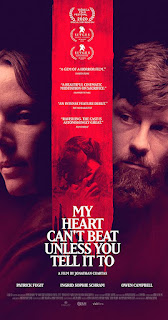


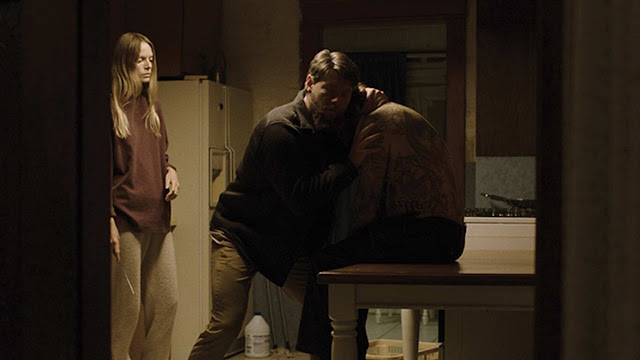
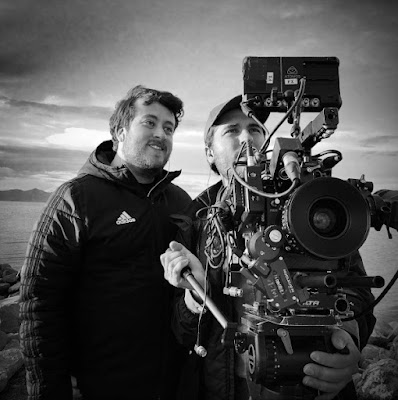
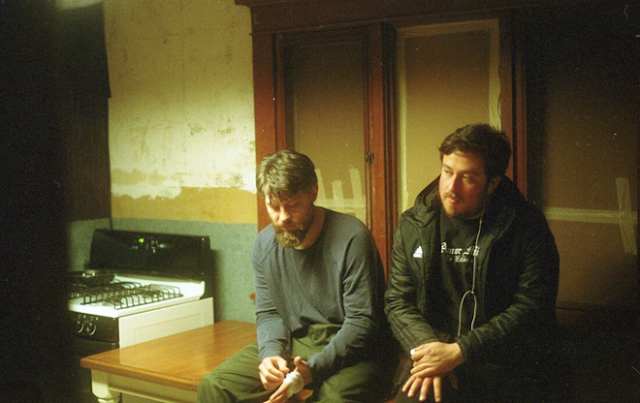

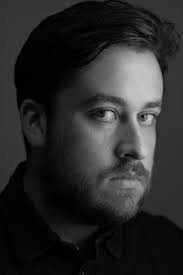



0 comments:
Post a Comment